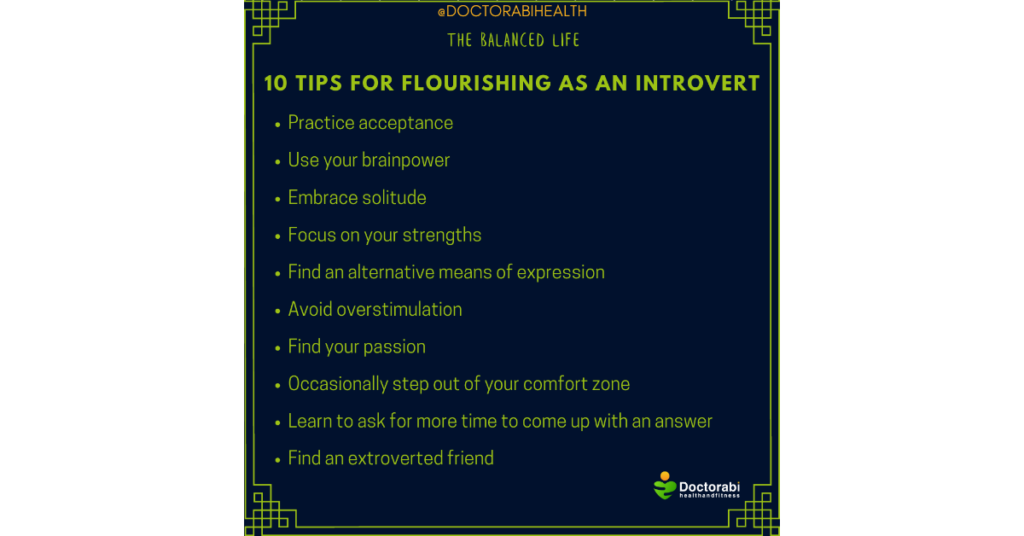The primary reason for this blog post, “10 tips for flourishing as an introvert”, is to shed some light on the mechanisms of the introverted brain. The second reason is to help introverts function optimally, as introverts often seek help because they do not understand how their brains work. A final reason for this blog post is to highlight # 10. Let’s keep what I have to say about # 10 a secret until I get there.
What is your personality type?
Are you an introvert or an extrovert? If your personality has a balance of extrovert and introvert features, you are regarded as an ambivert.

To find out more about your personality, take this free test. I took the test, and these are my results.
Before sharing these 10 tips for flourishing as an introvert, I’d like to make a few points. First, both introverts and extroverts struggle. However, the introvert may perceive their struggle more than the extrovert. In fact, the extrovert may not perceive a problem at all until things get way out of hand. Secondly, our world culture may make us think that introversion is a problem. That is why there are many books and courses out there focusing on helping introverts. And finally, as introverts, our analytical skills have many pluses, but one of the minuses is that we overthink things. As a result of our overthinking, we perceive that there is something wrong with us when, in fact, there isn’t!
If you are struggling as an introvert, first, let me tell you that you are not alone. In a random sample completed about two decades ago, introverts made up 50.7% and extroverts 49.3% of the United States general population. And of the world’s population, 30–75% are introverts. Second, applying these 10 tips for flourishing as an introvert will help you navigate your world and keep you in balance.
10 tips for flourishing as an introvert

1) Practice acceptance
Understand that, basically, you are created the way you are. There is nothing wrong with being an introvert. Whatever your personality, you are uniquely gifted to fulfill your purpose on earth. Imagine how chaotic the world would be if we all were extroverts. Or how quiescent the world would be if we all were introverts. We need a balanced world, and you are an irreplaceable part of that balanced ecosystem.
2) Use your brainpower
The introvert’s brain is slightly structurally different from that of an extrovert. Several studies have found that your level of introversion or extraversion may be based on the amount of grey matter you have in different regions of your brain. Generally, introverts are more likely to think things through and are less impulsive because of their calculated and analytical predisposition. Understanding how your brain works helps you identify areas where you can excel, and you should use this to your advantage.
3) Embrace Solitude
Introverts must have some alone time during the day to recharge their energy. Solitude is as essential to an introvert as food is to a starving man. It may, at first, be difficult to explain to your friends and family how much you crave your alone time. But, with time, they will understand that they can only get the best out of you after you have spent time alone to “reset your brain.”

4) Focus on your strengths
Identify your strengths and hone your skills. Focusing on your strengths will help you direct your energy inwards. As an introvert, you function optimally when your energy is directed inwards rather than outwards. So, instead of wasting your energy on things you are not good at, focus on your strengths, and aim to excel in your areas of greatness.
5) Find an alternative means of expression
There are several less traditional ways for introverts to communicate effectively. Writing, especially, can be an effective means of communication for the introverted brain. Journaling, blogging, and e-mails are ways for the introvert to harness the power of the written word.
6) Avoid overstimulation
As introverts, you have to become aware of situations that get you overstimulated and purposefully avoid or reduce time spent in those environments. For example, you may enjoy going to parties but find the party environment overstimulating. In such instances, you can plan to leave the party early so you do not end up feeling drained.

7) Find your Passion
Introverts are often profoundly passionate about one or more things, usually something they can engage in alone. Sharing this passion with others is another way to communicate effectively. Make it a goal to identify and learn more about the activities that you enjoy. As a matter of fact, learning is a survival tool for introverts because it involves processing information to make it readily assimilated by the brain. This learning process directs energy inwards and helps the introvert stay in sync. Reading, writing, playing an instrument, exercising, and many other passions are examples of activities you can engage in as an introvert.
8) Occasionally step out of your comfort zone
Stepping out of your comfort zone can be a cause of anxiety for many introverts. However, it is an absolute must for growth. In actual fact, the introvert’s brain can handle stepping out of one’s comfort zone way more than you believe. There are several different ways to do this. One way is to engage the complete analytical and critical thinking skills of the introverted brain. Think it through till the end. Weigh the pros and cons of stepping out of your comfort zone. Then plan your execution, and most importantly, include a plan to step back into your comfort zone intermittently. This strategic planning and execution process reduces your anxiety levels when you step out of your comfort zone.

9) Learn to ask for more time to come up with an answer
The thought process of an introvert is quite complicated. What might seem like a simple question to an extrovert usually requires a prolonged analysis before an introvert can produce an optimal answer. Sometimes, you may be in a situation that demands an immediate response. The problem is, when introverts answer spontaneously without thinking things through, it puts them out of balance. Your brain is still trying to process an answer after you have already committed with your spoken word. The introvert needs to make sure that their brain’s response aligns with their spoken word. Therefore, it is okay to ask for more time to come up with an answer.
10) Find an extroverted friend
Most introverts have introverted friends, but you need at least one extrovert friend for balance as an introvert. While an extrovert can have many shallow relationships, introverts have deeper relationships with very few close friends. Your extroverted close friend helps you find balance because you do need friends. Through your extroverted friend, you interact with other friends that fall outside your closest layer of friends. These other friends are people you care about, in fact, quite deeply. But your brain balance is disrupted by having too many close friends. So, one solution is to have an extroverted friend that serves both as a link and a filter to your other friends.
Now to the final reason for this blog post. Today happens to be the Birthday of my extrovert best friend, and I dedicate this blog post to her. My best friend of close to 30 years believes she is an introvert, but she is as extroverted as they come. We have that argument all the time. Today, I am challenging her to take her test and share her results on social media. Let’s put this argument to rest once and for all (She knows absolutely nothing about this challenge yet)! And she will probably murder me when she finds out.

Anyway, while I am still alive, I want to celebrate my best friend, Dr. Wumi Iyaoromi. This lady is extremely selfless and, quite possibly, the nicest person I know. In fact, I tell her all the time that she is too nice! Wumi, I appreciate your love, support, and friendship. Our daily chats, check-ins, and long talks mean the world to me. Your slightly different approach to things makes me see the world from a different angle. How we became besties is a mystery, but God knows the friends we need for the different seasons of our lives. Thanks for being an all-season friend. You are loved and highly appreciated. Now, take the test already and post your results! Let’s put this age-old argument to rest once and for all! Happy Birthday, dear friend.
Final Thoughts
While researching for this blog post, I came across several articles on how to become an extrovert. No offense to extroverts, but as an introvert, why would you want to become an extrovert? You are part of an elite group of influential people like Abraham Lincoln, Bill Gates, Eleanor Roosevelt, Warren Buffett, Mahatma Gandhi, and Albert Einstein. So, embrace who you are and keep flying high.
Yours in health and fitness
Doctor Abi

